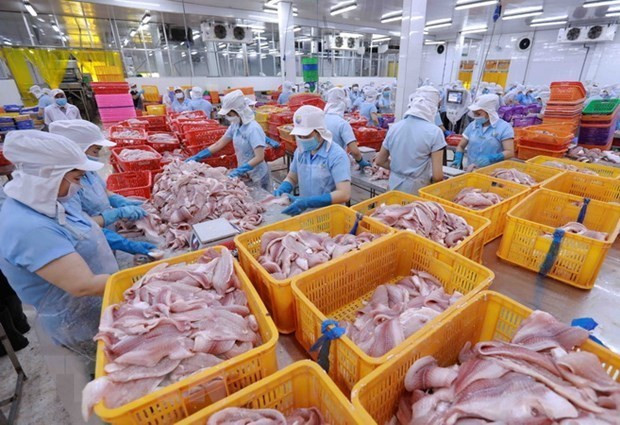
Japan tops importers of Vietnam’s aquatic products in Q1. (Photo: VNA)
However, the revenue from this market still dropped 11% year on year, statistics show.
Exports to Japan fell sharply in terms of some key products such as white-legged shrimp down 35%, salmon down 4%, and octopus down 6%. Meanwhile, increases were seen mainly in caught seafood, including squid, scad, pollock, tuna, and jack mackerel, rising about 13 - 88%.
Ranking second, the US’s fishery imports from Vietnam plunged 50% to about 290 million USD.
The US purchases mainly frozen products while in this segment, Vietnam is facing great competition pressure in both supply and prices from India, Ecuador, and Indonesia, VASEP noted.
Shipments to China, another major market, declined 22% to approximate 255 million USD in Q1. Tra fish made up the majority of fishery exports to this neighbouring market, 61%, while shrimp about 20%.
The Republic of Korea (RoK)’s purchase of fishery products from Vietnam also dropped 13% to nearly 178 million USD. The four products with the highest export values, namely white-legged shrimp, octopus, surimi fish ball, and squid, also witnessed year-on-year decreases of 2 - 26%. Meanwhile, growth was seen in the export value of sea shrimp (up 26%), tuna (nearly eight-fold), sea cucumber (51%), clam (63%), and tra fish (24%).
Exports to the EU were valued at 210 million USD in Q1, down 29%, statistics show.
VASEP predicted that China will become the largest market of Vietnam’s fishery products, but the competition pressure is huge as exporters in other countries are also focusing on this Northeast Asian market after its post-pandemic reopening.
Meanwhile, shipments to the EU, the US, Japan, and the RoK are unlikely to make breakthroughs because high inflation has caused consumers there to spend less, and average export prices have declined from last year, according to VASEP./. VNA
Exports to Japan fell sharply in terms of some key products such as white-legged shrimp down 35%, salmon down 4%, and octopus down 6%. Meanwhile, increases were seen mainly in caught seafood, including squid, scad, pollock, tuna, and jack mackerel, rising about 13 - 88%.
Ranking second, the US’s fishery imports from Vietnam plunged 50% to about 290 million USD.
The US purchases mainly frozen products while in this segment, Vietnam is facing great competition pressure in both supply and prices from India, Ecuador, and Indonesia, VASEP noted.
Shipments to China, another major market, declined 22% to approximate 255 million USD in Q1. Tra fish made up the majority of fishery exports to this neighbouring market, 61%, while shrimp about 20%.
The Republic of Korea (RoK)’s purchase of fishery products from Vietnam also dropped 13% to nearly 178 million USD. The four products with the highest export values, namely white-legged shrimp, octopus, surimi fish ball, and squid, also witnessed year-on-year decreases of 2 - 26%. Meanwhile, growth was seen in the export value of sea shrimp (up 26%), tuna (nearly eight-fold), sea cucumber (51%), clam (63%), and tra fish (24%).
Exports to the EU were valued at 210 million USD in Q1, down 29%, statistics show.
VASEP predicted that China will become the largest market of Vietnam’s fishery products, but the competition pressure is huge as exporters in other countries are also focusing on this Northeast Asian market after its post-pandemic reopening.
Meanwhile, shipments to the EU, the US, Japan, and the RoK are unlikely to make breakthroughs because high inflation has caused consumers there to spend less, and average export prices have declined from last year, according to VASEP./. VNA